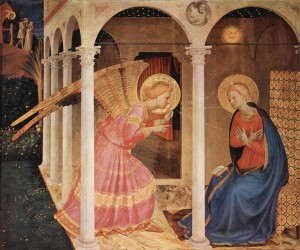
There are a few moments on which the history of the world swings like a hinge. People my age remember exactly where they were when the Twin Towers fell.
For Christians the real hinge moments are long before our own lives: Jesus’ death on the cross on Good Friday; his rising from the grave Easter Sunday; his birth thirty years or so earlier in Bethlehem.
But consider one other day.
Consider a day before Jesus’ birth — nine months before to be exact.
If December 25 were really his birthday, March 25 would be the day. That is the day on which Jesus own incarnation hinged. Traditionally Christians call it
the Annunciation.”
As Luke’s Gospel tells it, a young woman named Mary was going about her business. No telling just what she was doing.
One thing we can be sure of: she wasn’t sewing maternity clothes.
Suddenly a mysterious stranger appears. It is the Angel Gabriel. He tells Mary that she is the chosen one. No telling just why.
One thing we can be sure of: she found favor in God’s eyes.
Finding favor in God’s eyes led to God calling her to a new line of work. Hard to describe her new calling adequately.
One thing we can be sure of: God’s calling was enormously inconvenient.
Gabriel told this young unmarried woman that she was going to become pregnant. The child she bore would be the long-awaited rescuer of humanity, the Son of God, the “Messiah” or “anointed one.” Prophets, priests, and kings were all anointed for their work, and her son, Jesus, would be all of these things and more.
So here’s the interesting thing: Mary said
YES!”
The wording of her response shows me that she thought she had a choice in the matter:
Here am I, the servant of the Lord; let it be with me according to your word.’
She said yes. Jesus was born — and lived and died and rose again — and now everything is changed.
Here’s the funny thing: Protestants don’t like to talk about Mary too much. It is a bit of left over bad feeling from the 16th century when our churches became separate from Rome’s leadership. Protestant leaders looked at how Catholics talked about Mary and it seemed to veer into idolatry. And so you’ll still find Protestants who seem to have a problem with her.
But think about it: No Mary, no Jesus.
Mary is one amazing role model for the followers of her son. Listening hard and saying “YES!” matters. That’s what faith looks like.
For us it may not be so profound. We aren’t going to be a hinge point in the history of salvation. It has already been done.
And for us it probably not going to be so clear. Gabriel only shows up on an “as needed” basis.
But if we listen to Scripture to learn what God is about in our world,
and if we look to the world to see where that is exactly what is needed,
we might just find God’s call smoldering deep in our hearts, waiting to be noticed.
God has some work for you to do. Say yes to God. That’s the main thing.
I’d love to hear from you in the comments: When was a time you said “YES!” to God? What do you need to be saying “YES!” about today?
____________
If you enjoy looking back to the best of the Christian past for wisdom in following Christ today, get your FREE copy of my new book Love Your Bible: Finding Your Way to the Presence of God with a 12th Century Monk. Just click here so I can send it to you.

Hi Gary,
Thanks for this. I was looking for a devotional for my moms prayer group this morning & will read this to them and cite you.
It reminded me of something Sandy Hackett preached last fall, probably based on Brian McLaren’s book. The idea was, maybe it took God 400 years to get the Israelites out of Egypt because it took 400 years for somebody to say, “yes” to his call. We don’t know about the people who said, “No.” They don’t get written about in the Bible. It may or may not be true, that God asked other people to go for him. Maybe God knew that Mary would say yes. But if God really gives us freewill to choose, then there has to be the chance, at least the positive probability, that God has plans, he asks and we say, “No.” And it changes the course of history forever.
I’ve heard preachers talk about Jesus coming at just the right time – the Roman roads making the spread of the gospel possible, etc. But what if God had asked a Jewish girl back in, say Alexander the Great’s day? And the gospel had been spread across Asia with that empire?
I guess it’s something to ponder in the “what does it mean to me?” stage of Bible study. When we say “yes” or “no” to God, we have no clue how significant our response might be to history. It’s just a choice to go with the plan or kick the can down the road to somebody else. From now on, “will all generations call me blessed?” or not?
Thanks Amy! I’d love to hear what the group thinks about the post as a devotional. (Hope you’ll also encourage them to stop by the blog for a copy of “Love Your Bible”!)